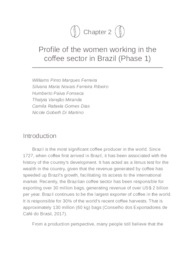Profile of the women working in the coffee sector in Brazil (Phase 1).
Profile of the women working in the coffee sector in Brazil (Phase 1).
Author(s): FERREIRA, W. P. M.; RIBEIRO, S. M. N. F; FONSECA, H. P.; MIRANDA, T. V.; DIAS, C. R. G.; DI MARTINO, N. G.
Summary: Brazil is the most significant coffee producer in the world. Since 1727, when coffee first arrived in Brazil, it has been associated with the history of the country?s development. It has acted as a litmus test for the wealth in the country, given that the revenue generated by coffee has speeded up Brazil?s growth, facilitating its access to the international market. Recently, the Brazilian coffee sector has been responsible for exporting over 30 million bags, generating revenue of over US$ 2 billion per year. Brazil continues to be the largest exporter of coffee in the world. It is responsible for 30% of the world?s recent coffee harvests. That is approximately 130 million (60 kg) bags (Conselho dos Exportadores de Café do Brasil, 2017). From a production perspective, many people still believe that the coffee workforce is mainly made up of men. In fact, a significant part of this sector?s workers is female, and women must gain space and visibility in this market. History shows that the battle for recognition of women?s work is hard but gratifying.
Publication year: 2018
Types of publication: Book sections
Unit: Embrapa Coffee
Keywords: Agribusiness, Agricultural industry, Rural women, Women
Observation
Some of Embrapa's publications are published as ePub files. To read them, use or download one of the following free software options to your computer or mobile device. Android: Google Play Books; IOS: iBooks; Windows and Linux: Calibre.
Access other publications
Access the Agricultural Research Database (BDPA) to consult Embrapa's full library collection and records.
Visit Embrapa Bookstore to purchase books and other publications sold by Embrapa.

